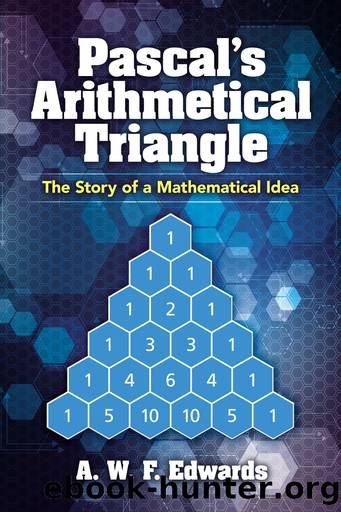Pascal's Arithmetical Triangle : The Story of a Mathematical Idea (9780486840765) by Edwards A. W. F

Author:Edwards, A. W. F.
Language: eng
Format: epub
Publisher: Inscribe Digital
Published: 2019-09-15T00:00:00+00:00
to represent (a + e)2½, but since it would presumably contain more terms than three but fewer than four he "gave it over as a thing not feasible. That is, not a terminated Proportion". He then quotes the multiplicative formula Newton uses [28] "(what I had formerly sought after, but unsuccessfully)". Here Wallis seems to be admitting his ignorance of the multiplicative formula (5.2) even for integral powers, which is strange, for even if he had not read Briggs, given the formulae for the figurate numbers and the determination to find its equivalent for the binomial numbers, the transformation is simple by the standards of Wallis's other work.
James Gregory independently discovered the general binomial expansion in November 1670 [29]. Formal proofs of the theorem were lacking for many years, being ultimately furnished by Euler for rational exponents and Abel for the completely general case [30]. On its influence in the development of the calculus by Newton we need hardly comment; by leading the way to it, Pascal's Arithmetical Triangle played a vital role, a role which, as we see next, was paralleled in Leibniz's own discovery of the calculus.
Gottfried Wilhelm Leibniz was born in Leipzig in 1646. He delivered the Disputatio arithmetica de complexionibus in March 1666 as a new Master of Arts at the university there [31], and it was printed later that year in enlarged form as the Dissertatio de arte combinatoria [32]. Leibniz was not then aware of Pascal's Traité, which had appeared the previous year, and apparently drew his inspiration largely from a book of mathematical recreations by Schwenter [33]. From our point of view there are three noteworthy results in the Dissertatio. First, the direct combinatorial proof of the addition relation in the Arithmetical Triangle (7.1), which thus appeared under his name only a year after it had appeared under Pascal's; secondly, a table explaining how the ten combinations of five things taken three at a time (5C3) can be derived from the combinations of two, three, and four things taken two at a time (2C2 + 3C2 + 4C2); and thirdly the observation (without proof) that if n is prime it divides for all r between 1 and n â 1, a result observed for n = 7 by Rabbi ben Ezra in about 1140 [34]. The importance of this early work lies in the fact that when Leibniz arrived in Paris in 1672 his familiarity with the Arithmetical
Triangle enabled him to generalize his solution to a problem put to him by Huygens in a way which, by his own account, provided the insight into the inverse relationship between quadrature and finding the tangent which was crucial to his development of the calculus [35].
Before he met Huygens, Leibniz developed a theorem on the summation of consecutive terms of a series of differences. Consider the sequence
Download
This site does not store any files on its server. We only index and link to content provided by other sites. Please contact the content providers to delete copyright contents if any and email us, we'll remove relevant links or contents immediately.
| Algebra | Calculus |
| Combinatorics | Discrete Mathematics |
| Finite Mathematics | Fractals |
| Functional Analysis | Group Theory |
| Logic | Number Theory |
| Set Theory |
Modelling of Convective Heat and Mass Transfer in Rotating Flows by Igor V. Shevchuk(6421)
Weapons of Math Destruction by Cathy O'Neil(6249)
Factfulness: Ten Reasons We're Wrong About the World – and Why Things Are Better Than You Think by Hans Rosling(4724)
A Mind For Numbers: How to Excel at Math and Science (Even If You Flunked Algebra) by Barbara Oakley(3288)
Descartes' Error by Antonio Damasio(3261)
Factfulness_Ten Reasons We're Wrong About the World_and Why Things Are Better Than You Think by Hans Rosling(3224)
TCP IP by Todd Lammle(3170)
Fooled by Randomness: The Hidden Role of Chance in Life and in the Markets by Nassim Nicholas Taleb(3093)
Applied Predictive Modeling by Max Kuhn & Kjell Johnson(3050)
The Tyranny of Metrics by Jerry Z. Muller(3050)
The Book of Numbers by Peter Bentley(2955)
The Great Unknown by Marcus du Sautoy(2676)
Once Upon an Algorithm by Martin Erwig(2638)
Easy Algebra Step-by-Step by Sandra Luna McCune(2619)
Lady Luck by Kristen Ashley(2568)
Practical Guide To Principal Component Methods in R (Multivariate Analysis Book 2) by Alboukadel Kassambara(2529)
Police Exams Prep 2018-2019 by Kaplan Test Prep(2527)
All Things Reconsidered by Bill Thompson III(2381)
Linear Time-Invariant Systems, Behaviors and Modules by Ulrich Oberst & Martin Scheicher & Ingrid Scheicher(2356)
